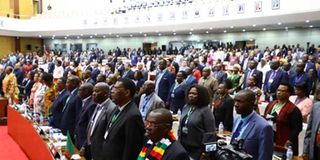Ministers propose official use of Kiswahili in Sadc meetings

What you need to know:
- If approved by Heads of State, it means that Kiswahili will now become the 4th language to be used among Sadc countries, alongside three others that are currently in use: French, Portuguese and English.
Dar es Salaam. The Council of ministers under the Southern African Development Community (Sadc) on Wednesday August 14 proposed that Kiswahili be one of official languages of communication among the member states.
If approved by Heads of State, it means that Kiswahili will now become the 4th language to be used among Sadc countries, alongside three others that are currently in use: French, Portuguese and English.
The newly inaugurated Chairman of Sadc Council of Ministers Prof Prof Palamagamba Kabudi said, “This will be good news for Tanzania in which the language is widely used. To begin with, we would wish to see Kiswahili being used among the council of ministers, in speeches and-in the near future, be used in documents.”
Kiswahili will, from 2020, become the latest language to be taught in South Africa’s classrooms. This East African lingua franca, which is also an official language of the African Union, will be an optional subject.
Speaking in September 2018, South Africa basic education minister Angie Motshekga announced that Kiswahili has been approved as the second language that will be offered to learners in South African schools. It will be offered at public, private and independent schools.
The language is currently being spoken widely in the larger Eastern Africa region as a lingua franca, a language used between people who don’t speak one another’s native language.
It’s a national language in Kenya, Uganda and Tanzania, and an official language of the East African Community which comprises Kenya, Uganda, Tanzania, Rwanda, Burundi and South Sudan.



